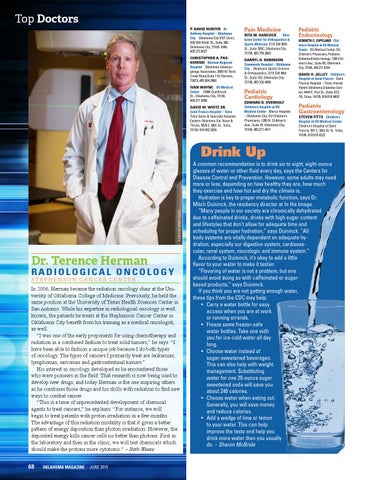Top Doctors P. DAVID HUNTER St. Anthony Hospital – Oklahoma City Oklahoma City ENT Clinic, 535 NW Ninth St., Suite 300, Oklahoma City, 73102-1049, 405.272.6027
Pain Medicine
CHRISTOPHER A. PASKOWSKI Norman Regional Hospital Oklahoma Otolaryngology Associates, 3650 W. Rock Creek Road,Suite 110, Norman, 73072, 405.364.2666
DARRYL D. ROBINSON Community Hospital – Oklahoma City Oklahoma Sports Science & Orthopaedics, 3110 SW 89th St., Suite 102, Oklahoma City, 73159, 405.703.4950
IVAN WAYNE OU Medical Center 13904 Quailbrook Dr., Oklahoma City, 73134, 405.271.5950
Pediatric Cardiology
DAVID W. WHITE SR. Saint Francis Hospital – Tulsa Tulsa Spine & Specialty Hospital, Eastern Oklahoma Ear, Nose & Throat, 5020 E. 68th St., Tulsa, 74136, 918.492.3636
RITA M. HANCOCK Oklahoma Center for Orthopaedics & Sports Medicine 3110 SW 89th St., Suite 200C, Oklahoma City, 73159, 405.759.2663
EDWARD D. OVERHOLT Children’s Hospital at OU Medical Center Mercy Hospital – Oklahoma City, OU Children’s Physicians, 1200 N. Children’s Ave., Suite 2F, Oklahoma City, 73104, 405.271.4411
Pediatric Endocrinology
KENNETH C. COPELAND Children’s Hospital at OU Medical Center OU Medical Center, OU Children’s Physicians, Pediatric Diabetes/Endocrinology, 1200 Children’s Ave., Suite 4D, Oklahoma City, 73104, 405.271.6764 DAVID H. JELLEY Children’s Hospital at Saint Francis Saint Francis Hospital – Tulsa, Harold Hamm Oklahoma Diabetes Center, 4444 E. 41st St., Suite SCC1B, Tulsa, 74135, 918.619.4803
Pediatric Gastroenterology
STEVEN FITTS Children’s Hospital at OU Medical Center Children’s Hospital at Saint Francis, 591 E. 36th St. N., Tulsa, 74106, 918.619.4323
PHOTO BY BRENT FUCHS.
Drink Up
Dr. Terence Herman
RADIOLOGICAL ONCOLOGY STEPHENSON CANCER CENTER
In 2006, Herman became the radiation oncology chair at the University of Oklahoma College of Medicine. Previously, he held the same position at the University of Texas Health Sciences Center in San Antonio. While his expertise in radiological oncology is well known, the patients he treats at the Stephenson Cancer Center in Oklahoma City benefit from his training as a medical oncologist, as well. “I was one of the early proponents for using chemotherapy and radiation in a combined fashion to treat solid tumors,” he says. “I have been able to fashion a unique job because I do both types of oncology. The types of cancers I primarily treat are leukemias, lymphomas, sarcomas and gastrointestinal tumors.” His interest in oncology developed as he encountered those who were pioneers in the field. That research is now being used to develop new drugs, and today Herman is the one inspiring others as he combines those drugs and his skills with radiation to find new ways to combat cancer. “This is a time of unprecedented development of chemical agents to treat cancers,” he explains. “For instance, we will begin to treat patients with proton irradiation in a few months. The advantage of this radiation modality is that it gives a better pattern of energy deposition than photon irradiation. However, the deposited energy kills cancer cells no better than photons. First in the laboratory and then in the clinic, we will test chemicals which should make the protons more cytotoxic.” – Beth Weese
68
OKLAHOMA MAGAZINE | JUNE 2015
A common recommendation is to drink six to eight, eight-ounce glasses of water or other fluid every day, says the Centers for Disease Control and Prevention. However, some adults may need more or less, depending on how healthy they are, how much they exercise and how hot and dry the climate is. Hydration is key to proper metabolic function, says Dr. Mitch Duininck, the residency director at In His Image. “Many people in our society are chronically dehydrated due to caffeinated drinks, drinks with high sugar content and lifestyles that don’t allow for adequate time and scheduling for proper hydration,” says Duininck. “All body systems are vitally dependent on adequate hydration, especially our digestive system, cardiovascular, renal system, neurologic and immune system.” According to Duininck, it’s okay to add a little flavor to your water to make it tastier. “Flavoring of water is not a problem, but one should avoid doing so with caffeinated or sugarbased products,” says Duininck. If you think you are not getting enough water, these tips from the CDC may help: • Carry a water bottle for easy access when you are at work or running errands. • Freeze some freezer-safe water bottles. Take one with you for ice-cold water all day long. • Choose water instead of sugar-sweetened beverages. This can also help with weight management. Substituting water for one 20-ounce sugar sweetened soda will save you about 240 calories. • Choose water when eating out. Generally, you will save money and reduce calories. • Add a wedge of lime or lemon to your water. This can help improve the taste and help you drink more water than you usually do. – Sharon McBride
